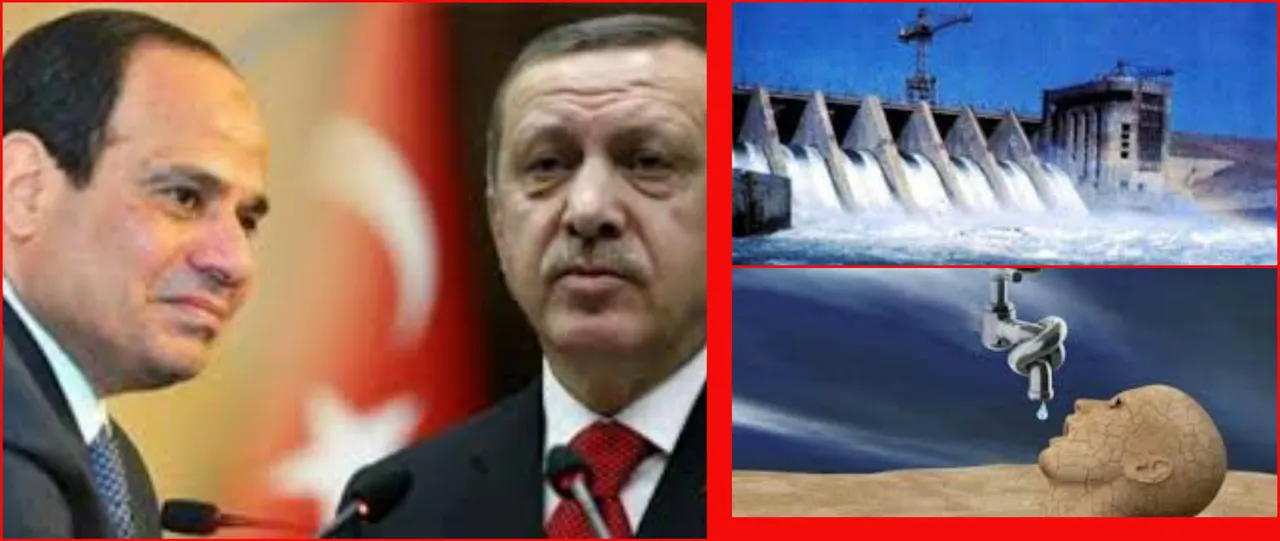
may Experts and research centers around the world have warned for years of water wars, especially in the Middle East
And the world
Despite the privilege of a number of important rivers such as the Nile River, and after filling the Renaissance has emerged a new crisis between Iran and Turkey.
Iran and Turkey
The Deputy Director-General of the Iranian Company for the Distribution of Water and Sewage Services of the Iranian Ministry of Energy, Hadayat Fahmi, on Sunday urged Turkey to address the problem of dust storms, which hit the regional countries chronically as a result of Ankara's huge projects to build dams as part of the project of southeast Anatolia Turkish known The name "Gap".
Turkey has built 22 dams on the Tigris and Euphrates, which also extend through Syria, Iraq and Iran.
Iran says the project reduced the flow of water in the river basin by 34 percent, drying up 94 percent of Mesopotamia and increasing dust storms in Syria and Iraq, which are turning to Iran and paralyzing life in the southwestern and western provinces.
In May, a group of Iranian citizens sent a letter to the United Nations in protest against the construction of the Turkish dam on the Tigris River.
Egypt and Ethiopia
The dispute between the two countries over the renaissance in Ethiopia after the revolution of January 25, 2011, and slowly began the media to show citizens the danger of this dam on the share of Egyptians share of the Nile water.
In an article last April, South African writer Jaffin de Vineg put a great deal of pressure on the downstream countries, such as Egypt and Sudan, which depend heavily on the flow of water from Ethiopian territory.
He pointed to the danger to Egypt, despite the agreement signed with Ethiopia and Sudan, explaining that the risk lies in the timeframe to fill the reservoir, which needs between 5 to 15 years, according to a study by Yale University of America.
Lebanon and Israel
The waters of the Hasbani and Al-Wazzani rivers are the focus of Israel's greed. These ambitions are not the result of successive wars between Lebanon and Israel, but rather of the pre-establishment of the Jewish state. Since 1919, the Zionist movement has been thinking about filling part of the need for northern Israeli water resources from Lebanon.

The conflict on the Wazzani River last October, with the intent of the Israeli occupation army, to install new surveillance cameras at the barbed wire fence off the Wazzani area in southern Lebanon.
The official Lebanese news agency said that a technical team from the Israeli army installed the cameras in the face of the stream of the "Wazzani" protected three armored military vehicles, noting that this was accompanied by patrols along the border line in the eastern sector of southern Lebanon.
The Lebanese army, announced on the tenth of last September, the discovery of an Israeli spy planted inside the Lebanese border, and removed.
Iraq and Iran
With the withdrawal of the Arabian Gulf site last September, the war on water and oil is a hidden Iranian war practiced by Iran in all malicious and twisted ways to expand its borders and territorial waters by attacking Iraq's borders and resources without any resistance from the government of Haider al-Abadi. Iran has increased the area of Iranian territorial waters at the expense of Iraq, and seeks to bite more of Iraq's territory and steal its oil wealth in ways that are malicious to control the Shatt al-Arab in full.
Observers warned that a coup in the course of the Iraqi navigation corridor in the Shatt al-Arab, gives Iran arguments and geographical and hydrographic pretexts to control the Iraqi ports, and the ongoing land-clearing process enables Iran to extend its control and control of Iraqi commercial and oil ports.
The British Broadcasting Corporation (BBC) highlighted in a report on Monday the lack of familiarity with Cairo airport security staff and employees with the latest Western products.
Tehran has used all the weapons available to it, including water, as it changed the course of many of the Iranian rivers that were pouring into Iraqi territory, especially the "Karun River" and the river "Karkh" towards the Iranian depth, which greatly affected the water level in the Shatt al-Arab and the imbalance of border markers And increased the area of Iranian territorial waters at the expense of Iraq.